Asset protection
No Fear Mongering, Just Facts
Group of 20 finance chiefs and central bankers said current risks include uneven growth and the possibility of excessive risk-taking in a low interest rate environment. They also pointed out that when push comes to shove, they will continue to stimulate. From Bloomberg:
“It is critical that we take concrete steps to boost growth and create jobs,” Australian Treasurer Joe Hockey, who hosted the meeting, told reporters after the communique was released. “We will use all levers available, including additional fiscal and monetary policy leverage where appropriate.”
This Is What Risk-Off Looks Like
If an increasing threat of a global recession is the primary concern, we would expect more conservative assets to be gaining traction. Investor preferences allow us to better understand the stock market’s risk-reward profile. For example, when economic fear was high in 2008, the performance of growth-oriented stocks (SPY) was weak relative to defensive-oriented bonds (AGG) (see chart below).
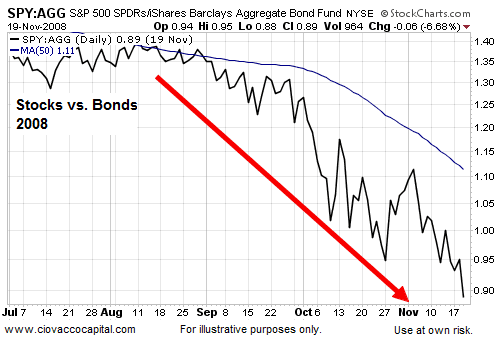
This is What Risk-On Looks Like
When fear started to subside in March 2009, equities started to outperform bonds, telling us the risk-reward profile of the general stock market was improving.
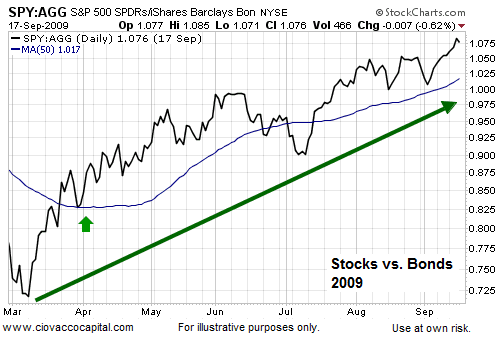
This Is What Today Looks Like
How does the same ratio look now? September 22, 2014 still looks similar to the “risk-on” period in 2009 rather than the “risk-off” period in 2008, which tells us the bias is still bullish looking out weeks and months. The chart below includes the weak open in stocks on September 22.
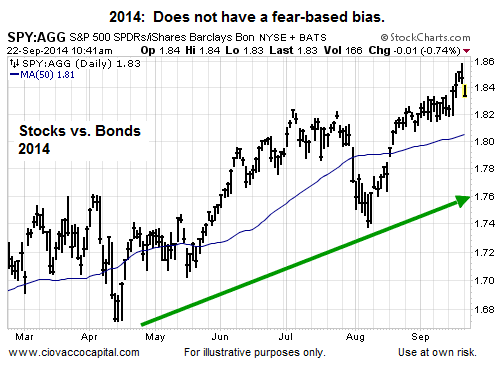
But, Bonds Are Impacted By The Fed
A fair criticism of the analysis above is “you can’t rely on those charts in a rising rate environment”. If the stock vs. bond charts are skewed, we can offset that by looking at stocks in isolation. This week’s stock market video compares the S&P 500 in 1987, 2002, 2003, 2007, and 2009 to the present day.
Video: Bear Market Odds: A Rational Assessment
Investment Implications – The Weight of The Evidence
Even with the S&P 500 down 14 points during Monday’s session, the intermediate-term trend in stocks remains up (see slope of blue 50-day below). Buyers could step in near various forms of possible support between 1975 and 1997.
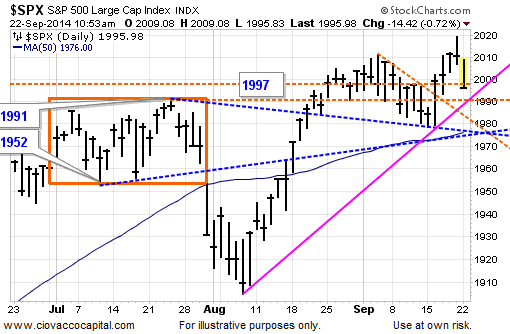
How long will the bullish trends hold? We don’t know and we do not need to know if we are willing to pay attention meticulously and make portfolio adjustments when the observable evidence changes in a meaningful way. The process could start soon, but for now Monday’s weakness still falls into the “normal and expected volatility within the context of a favorable trend” category. Therefore, we continue to hold stocks (SPY), leading sectors (XLK), and some offsetting exposure to bonds (TLT)

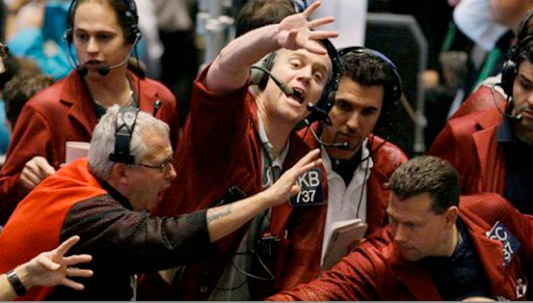
Today John Mauldin spoke with King World News about the great danger he believes may trigger a worldwide crash. Mauldin, President of Millennium Wave Securities, also warned that the problems in Europe are so enormous that it may ultimately shock the Europeans by causing the destruction of their currency.
….continue reading HERE
Ed Note: John Mauldin has a much longer article in his “Thoughts From The Frontline” posted below:
Thoughts from the Frontline – What’s on Your Radar Screen?
What’s on Your Radar Screen?
Emerging Markets Are Set Up for a Crisis
Who’s Competing with Whom?
O Canada, Where Are You Headed?
Thinking about Momentum
The Rational Bear
San Antonio, Washington DC, and Dallas
Toward the end of every week I begin to ponder what I should write about in the nextThoughts from the Frontline. Much of my week is spent in front of my iPad or computer, consuming as much generally random information as time and the ebb and flow of life will allow. I cannot remember a time in my life after I realized you could read and learn new things that that particular addiction has not been my constant companion.
As I sit down to write each week, I generally turn to the events and themes that most impressed me that week. Reading from a wide variety of sources, I sometimes see patterns that I feel are worthy to call to your attention. I’ve come to see my role in your life as a filter, a connoisseur of ideas and information. I don’t sit down to write with the thought that I need to be particularly brilliant or insightful (which is almighty difficult even for brilliant and insightful people) but that I need to find brilliant and insightful, and hopefully useful, ideas among the hundreds of sources that surface each week. And if I can bring to your attention a pattern, an idea, or thought stream that that helps your investment process, then I’ve done my job.
Sometimes I feel like an air traffic controller at “rush hour” at a major international airport. My radar screen is just so full of blinking lights that it is hard to choose what to focus on. We each have our own personal radar screen, focused on things that could make a difference in our lives. The concerns of a real estate investor in California are different from those of a hedge fund trader in London. If you’re an entrepreneur, you’re focused on things that can grow your business; if you are a doctor, you need to keep up with the latest research that will heal your patients; and if you’re a money manager, you need to keep a step ahead of current trends. And while I have a personal radar screen off to the side, my primary, business screen is much larger than most people’s, which is both an advantage and a challenge with its own particular set of problems. (In a physical sense this is also true: I have two 26-inch screens in my of fice. Which typically stay packed with things I’m paying attention to.)
So let’s look at what’s on my radar screen today.
First up (but probably not the most important in the long term), I would have to say, is Scotland. What has not been widely discussed is that the voting age was changed in Scotland just a few years ago. For this election, anyone in Scotland over 16 years old is eligible. Think about that for a second. Have you ever asked 16-year-olds whether they would like to be more free and independent and gotten a “no” answer? They don’t think with their economic brains, or at least most of them don’t. If we can believe the polls, this is going to be a very close election. The winning margin may be determined by whether the “yes” vote can bring out the young generation (especially young males, who are running 90% yes) in greater numbers than the “no” vote can bring out the older folks. Right now it looks as though it will be all about voter turnout.
(I took some time to look through Scottish TV shows on the issue. Talk about your polarizing dilemma. This is clearly on the front burner for almost everyone in Scotland. That’s actually good, as it gets people involved in the political process.)
The “no” coalition is trying to talk logic about what is essentially an emotional issue for many in Scotland. If we’re talking pure economics, from my outside perch I think the choice to keep the union (as in the United Kingdom) intact is a clear, logical choice. But the “no” coalition is making it sound like Scotland could not make it on its own, that it desperately needs England. Not exactly the best way to appeal to national instincts and pride. There are numerous smaller countries that do quite well on their own. Small is not necessarily bad if you are efficient and well run.
However, Scotland would have to raise taxes in order to keep government services at the same level – or else cut government services, not something many people would want.
There is of course the strategy of reducing the corporate tax to match Ireland’s and then competing with Ireland for businesses that want English-speaking, educated workers at lower cost. If that were the only dynamic, Scotland could do quite well.
But that would mean the European Union would have to allow Scotland to join. How does that work when every member country has to approve? The approval process would probably be contingent upon Scotland’s not lowering its corporate tax rates all that much, especially to Irish levels, so that it couldn’t outcompete the rest of Europe. Maybe a compromise on that issue could be reached, or maybe not. But if Scotland were to join the European Union, it would be subject to European Union laws and Brussels regulators. Not an awfully pleasant prospect.
While I think that Scotland would initially have a difficult time making the transition, the Scots could figure it out. The problem is that Scottish independence also changes the dynamic in England, making it much more likely that England would vote to leave the European Union. Then, how would the banks in Scotland be regulated, and who would back them? Markets don’t like uncertainty.
And even if the “no” vote wins, the precedent for allowing a group of citizens in a country within the European Union to vote on whether they want to remain part of their particular country or leave has been set. The Czech Republic and Slovakia have turned out quite well, all things considered. But the independence pressures building in Italy and Spain are something altogether different.
I read where Nomura Securities has told its clients to get out of British pound-based investments until this is over. “Figures from the investment bank Société Générale showing an apparent flight of investors from the UK came as Japan’s biggest bank, Nomura, urged its clients to cut their financial exposure to the UK and warned of a possible collapse in the pound. It described such an outcome as a ‘cataclysmic shock’.” (Source: The London Independent) The good news is that it will be over next Thursday night. One uncertainty will be eliminated, though a “yes” vote would bring a whole new set of uncertainties, as the negotiations are likely to be quite contentious.
One significant snag is, how can Scottish members of the United Kingdom Parliament continue to vote in Parliament if they are leaving the union?
I admit to feeling conflicted about the whole thing, as in general I feel that people ought have a right of self-determination. In this particular case, I’m not quite certain of the logic for independence, though I can understand the emotion. But giving 16-year-olds the right to vote on this issue? Was that really the best way to go about things? Not my call, of course.
Emerging Markets Are Set Up for a Crisis
We could do a whole letter just on emerging markets. The strengthening dollar is creating a problem for many emerging markets, which have enough problems on their own. My radar screen is full of flashing red lights from various emerging markets. Brazil is getting ready to go through an election; their economy is in recession; and inflation is over 6%. There was a time when we would call that stagflation. Plus they lost the World Cup on their home turf to an efficient, well-oiled machine from Germany. The real (the Brazilian currency) is at risk. Will their central bank raise rates in spite of economic weakness if the US dollar rally continues? Obviously, the bank won’t take that action before the election, but if it does so later in the year, it could put a damper on not just Brazil but all of South America. Take a look at this chart of Brazilian consumer price inflation vs. GDP:
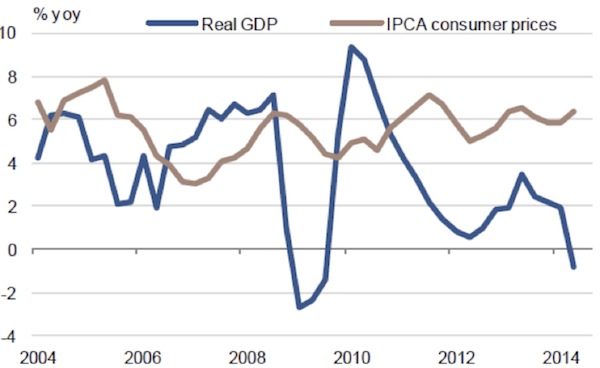
Turkey is beginning to soften, with the lira down 6% over the last few months. The South African rand is down 6% since May and down 25% since this time last year. I noted some of the problems with South Africa when I was there early this year. The situation has not improved. They have finally reached an agreement with the unions in the platinum mining industry, which cost workers something like $1 billion in unpaid wages, while the industry lost $2 billion. To add insult to injury, it now appears that a Chinese slowdown may put further pressure on commodity-exporting South Africa. And their trade deficit is just getting worse.
We could also do a whole letter or two on global trade. The Boston Consulting Group has done a comprehensive study on the top 25 export economies. I admit to being a little surprised at a few of the data points. Let’s look at the chart and then a few comments.
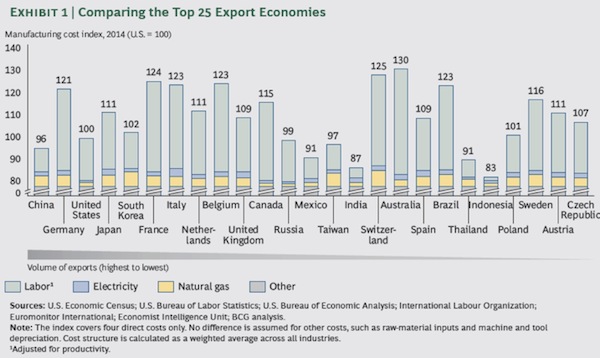
First, notice that Mexico is now cheaper than China. That might explain why Mexico is booming, despite the negative impact of the drug wars going on down there. Further, there is now not that much difference in manufacturing costs between China and the US .
Why not bring that manufacturing home – which is what we are seeing? And especially anything plastic-related, because the shale-gas revolution is giving us an abundance of natural gas liquids such as ethane, propane, and butane, which are changing the cost factors for plastic manufacturers. There is a tidal wave of capital investment in new facilities close to natural gas fields or pipelines. This is also changing the dynamic in Asia, as Asian companies switch to cheaper natural gas for their feedstocks.
(What, you don’t get newsfeeds from the plastic industry? Realizing that I actually do makes me consider whether I need a 12-step program. “Hello, my name is John, and I’m an information addict.”)
Note that Japan is about 10% cheaper than Germany, and those costs are going to drop more as the yen continues to fall. This will affect whether the European Central Bank will finally turn on the monetary spigot to try to produce a little inflation (as opposed to none). In any case, Germany would like to see the euro weakened. Note that Spain, with its aggressive labor reforms, has brought its cost of manufacturing down below that of Germany, to just about the lowest level in Europe. France is the high-cost producer in Europe with the exception of Switzerland, but they don’t do much head-to-head competing. Note, too, that China is no longer the low-cost Asian manufacturer. That’s Indonesia, by far.
O Canada, Where Are You Headed?
My friend Jared Dillian, ex-Wall Street trader and now the editor of a great newsletter humorously titled The Daily DirtNap, has been writing about the problems of Canada for the last several months. Some of it is anecdotal, as in four of the top five major bank CEOs have resigned in the last year, at relatively young ages. Just prior to the Canadian banks getting downgraded by S&P last month. Go figure.
Writes young Jared:
My thoughts: McCaughey is the – not kidding – fourth Canadian bank CEO to retire in the last year. RBC, TD, BNS, and now CIBC. And these guys are not that old. Late fifties, maybe. So it is clear what is going on here – they are cashing out on the highs. It is perfectly rational behavior. Come on – if you were a bank CEO, and you thought that your industry had years of upside left, would you get out? If you were 57? You would not.
The Canadian economy is almost entirely dependent upon its housing market for economic growth. Now, some of my Canadian readers will probably not want to acknowledge that Canadians have an obsession with housing. Debt-to-income levels in Canada are beginning to look a little toppish: $2 million is the new $1 million house. (And in Vancouver it is the half-million-dollar house.) But it has been that way for years. I haven’t written much about Canada lately, because I quite frankly don’t get it. But the country is on my radar screen. Because, I will admit, I really like Canada. At least in the summer.
Every week I get at least one email from my friend Alexander Ineichen in Zürich. He does this fabulous analysis of scores of momentum indicators all over the world. It’s a good way to get a quick read (well, not that quick, at 90 pages) on what is happening in the real world. Let me give you an example of one of his recent charts:
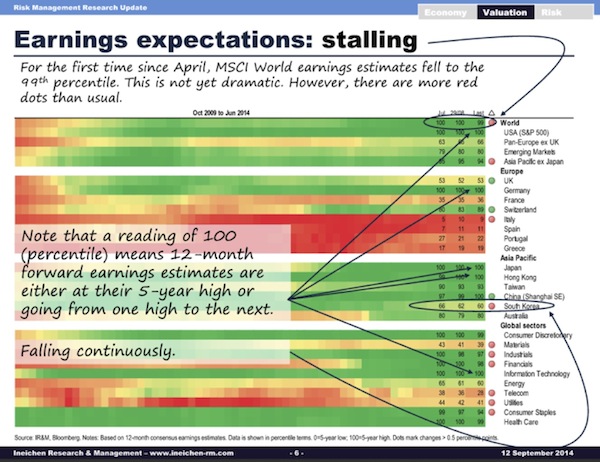
What I see when I glance through his PowerPoint is that leading indicators are beginning to stall, Eurozone economic sentiment is collapsing, and momentum is not in Germany’s favor. In general, Europe sucks (that is a technical economic term for newbies).
Recently, I’ve become aware of a fabulous young macroeconomic writer from Dubai by the name of Jawad Mian. Remember that name. I read a lot of macro letters, and his is one of the best. Rather than spend the pages that he deserves on his analysis, I just want to acknowledge that he brought to my attention a quote that I’d forgotten from my friend George Friedman of Stratfor. Friedman was responding to a comment by Louis Bacon, who had just returned $2 billion to his investors, complaining, “It is hard to figure out how to invest when actions taken by politicians can affect financial markets more than basic economic factors. The political involvement is so extreme – we have not seen this since the postwar era. What they are doing is trying to thwart natural market outcomes. It is amazing how important the decision-making of one person, Angela Merkel, has become to world markets.”
Friedman objected on the grounds that political decisions are in fact subject to analysis and constraints. He pointed out that Merkel was not acting on whims but on the basis of very real circumstances. Jawad quoted at length from George, but let me pull a few poignant paragraphs that we can all relate to:
The investors’ problem is that they mistake the period between 1991 and 2008 as the norm and keep waiting for it to return. I saw it as a freakish period that could survive only until the next major financial crisis – and there always is one. While the unusual period was under way, political and trade issues subsided under the balm of prosperity. During that time, the internal cycles and shifts of the European financial system operated with minimal external turbulence, and for those schooled in profiting from these financial eddies, it was a good time to trade.
Once the 2008 crisis hit external factors that were always there but quiescent became more overt. The internal workings of the financial system became dependent on external forces. We were in the world of political economy, and the political became like a tidal wave, making the trading cycles and opportunities that traders depended on since 1991 irrelevant. And so, having lost money in 2008, they could never find their footing again. They now lived in a world where Merkel was more important than a sharp trader. Actually, Merkel was not more important than the trader. They were both trapped within constraints about which they could do nothing. But if those constraints were understood, Merkel’s behavior could be predicted.
The real problem for the hedge funds was not that they didn’t understand what they were doing, but the manner in which they had traded in the past simply no longer worked. Even understanding and predicting what political leaders will do is of no value if you insist on a trading model built for a world that no longer exists. What is called high velocity trading, constantly trading on the infinitesimal movements of a calm but predictable environment, doesn’t work during a political tidal wave. And investors of the last generation do not know how to trade in a tidal wave. When we recall the two world wars and the Cold War, we see that this was the norm for the century and that fortunes were made. But the latest generation of investors wants to control risk rather than take advantage of new realities.
We have re-entered an era in which political factors will dominate economic decisions. This has been the norm for a very long time, and traders who wait for the old era to return will be disappointed. Politics can be predicted if you understand the constraints under which a politician such as Merkel acts and don’t believe that it is simply random decisions. But to do that, you have to return to Adam Smith and recall the title of his greatest work, The Wealth of Nations. Note That Smith was writing about nations, about politics and economics – about political economy.
It is getting close to time to hit the send button, and I must confess that this letter became overly long. Simply looking around at what was on my radar screen took me close to 15 pages, and I wasn’t even halfway through! Discretion being the better part of valor, and wishing to take pity on my ever-faithful readers, I simply cut the last half. Perhaps it will show up in some later missive.
But maybe this will give you a little understanding of the angst I go through each week, trying to decide what to write about. In 2006 I was beginning to reach for topics. Today there is literally no end of them.
In deleting half the letter, I left considerable notes on Japan and Europe on the cutting-room floor, as well as concerns about the current brouhaha over secular stagnation. Don’t even get me started on Fed policy and the cult that has developed around central bankers. I would probably start ranting about how monetary policy is about the fourth most important thing but has become an excuse for politicians to do nothing about the more important things that are at least obstensibly under their control.
So what’s on your radar screen?
I mentioned last week that my friend Tony Sagami is now publicly working for Mauldin Economics, and we can finally tell you that he has been the brains behind Yield Shark, which is our take on how to find yield in a low-interest-rate environment. Tony ranges all over the world finding those little anomalies which when put together can make a portfolio that generates reasonable yields in a tough investing environment. And every now and then he’s been able to capture some capital gains, which help the overall returns.
You will soon get an important email from Ed D’Agostino, the publisher of Mauldin Economics, telling you about the newest addition to our growing family of letters. Tony and I have been talking about this for some time, and we’ve decided to take advantage of his natural talent and launch a newsletter that will be called The Rational Bear. My good friend David Tice, who ran the successful Prudent Bear fund here in Dallas for so many years (and who lives in the same building I do) has spent a great deal of time with Tony, getting to know how he sees the world, and we agree that Tony has the right philosophy. And with the markets looking a little topping, the timing is not bad.
Just as with Yield Shark, Tony will be our international man. He will look for special situations all over the world that are just screaming “overvalued!” and work out how we go about timing what can be very difficult and sometimes dangerous trades. Shorting stocks is not for beginning investors. Seriously, don’t even think about trying to get your feet wet shorting by subscribing to The Rational Bear. Do your homework about all the risks first, before you start looking at the potential rewards!
With that caution, I think Tony will provide a very valuable service for serious traders. You will have another very astute set of eyes and ears scanning the world to help you with your portfolio research. And frankly, while we don’t talk about it much, we are building up a pretty cool team of researchers that help our writers dig deep and think wide. My partners at Mauldin Economics are handling our expansion, rapid though it is, in a very systematic and businesslike manner. We are all in good hands.
I know that some of you won’t need a letter from Ed to be persuaded to subscribe to The Rational Bear. Here is a link. Note that there is a serious discount off of the subscription price, which will last for only a short time. This is an introductory offer that will go away after launch. Also note that the letter is not cheap. The very nature of the letter means that there is a practical limit to how many subscribers we can have. Again, if you are serious, active investor, this is something you really want to look at. Subscribe now or wait for Ed’s note to tell you more, if you like.
San Antonio, Washington DC, and Dallas
I head to the Casey Research Summit in San Antonio, September 17-21. It actually takes place at a resort in the Hill Country north of San Antonio, which is a fun place to spend a weekend with friends. Then the end of the month will see me traveling to Washington DC for a few days.
I’ll be back in Dallas in time for my 65th birthday on October 4, and then I get to spend another two weeks at home before the travel schedule picks back up. I will make a quick trip to Chicago, then swing back to Athens, Texas, before I head on to Cambridge, Massachusetts, for conferences. There are a few other trips shaping up as well.
Tiffani (my oldest daughter) just sent me a text. It seems she is cleaning out her garage after accumulating a large number of boxes that have gone unopened for many moons. (That trait may be genetic.) I’m not quite sure how she got it, and neither is she, but she came across a paper that I wrote in my first year in seminary, back in 1973, entitled “Poverty and the Poor.” I have absolutely no idea what it says, but I’m looking forward to (and will probably be greatly embarrassed by) reading it. And yes, I went to seminary. I’m a full-fledged master divine or whatever they call the degree holder. I probably needed a 12-step program for that, too, for many years. Fortunately, I seem to have fully recovered. Time heals a multitude of sins, or something like that.
Taking a very full course load while also working a 40-hour week was tough, and it might have affected my academic effort. Evidently the professor who graded this paper thought so, as he or she gave me a B-. Tiffani said the prof wrote in the margin, “You need to do better research.” I’m sure there are lots of readers who concur with my professors. Now, however, my full-time job is research, so I have no excuse. If you give me a B- now, we just have to blame it on sloppy execution.
I’m really looking forward to being with so many friends in San Antonio this coming weekend. It will be my first opportunity to test my new travel resolve, which is to exercise more on the road. Having been home for more than a month and having been in the gym for at least six out of every seven days, I can see and feel a significant difference. It is tough for me to exercise on the road, but I have to figure out how to do it. Maybe I will start holding meetings on the treadmill.
I mean, last time I was in Singapore I had a morning meeting with Jim Rogers. I went to his house and sat outside while he pedaled like a madman on his exercise bike. He would have been about 70 at the time, and there is no way that I could even marginally keep up with him today (or ever!). He went for at least 90 minutes all-out. Outside in the heat and humidity. I was drenched with sweat just watching him. But he held his own in the conversation the entire time. He wasn’t even breathing hard when he got off the bike.
Have a great week and be sure and get a little exercise. You will live a little longer and feel a little better if you do.
Your always trying to think about what to write next analyst,

John Mauldin

 “The concept of order that has underpinned the modern era is in crisis.” – Henry Kissinger
“The concept of order that has underpinned the modern era is in crisis.” – Henry KissingerKissinger noted that the era between 1948 and 2000 could be considered an “amalgam of American idealism and traditional European concepts of statehood and balance of power. But vast regions of the world have never shared and only acquiesced in the Western Anglosphere concept of order. These reservations are now becoming explicit, for example, in the Ukraine crisis and the South China Sea. The order established…by the West stands at a turning point.”
But fired with the heady feeling of apparent ‘victory’, the Anglosphere attempted to ‘bend’ the agreed Cold War peace terms by extending NATO membership to the Baltic States, Hungary, Slovakia, Romania, and Poland. It was no secret that the Ukraine was next on NATO’s wish list. Such an outcome would have been very difficult for Russia to accept.
Like the Germans, the Russians are a proud and tough people. While ‘acquiescing’, to use Kissinger’s term, they resented deeply this seemingly covert aggression by the Anglosphere. Under a tough, patriotic and charismatic President Putin, Russia apparently now seeks to regain some of its lost regional sphere of influence or empire. In this very limited sense, the Putin/Hitler comparison is apt.
Amazingly, the Obama Administration failed to recognize the Crimea and the land bridge to it, as a vital Russian interest. As a result, the U.S. Administration badly bungled the diplomatic response to Russia’s annexation of the territory. Far more serious is the probability that Anglo miscalculation can force greater cooperation between Russia and China and perhaps even Russia and Germany.
In his efforts to strike back at Putin, Obama’s choice of weapons defies practical sense. The trade sanctions seem to offer little except discord among the NATO allies. It was recently revealed that Germany was forced to negotiate secretly with Russia to ensure the continuation of some 40 percent of its winter energy supplies. Sensing these divisions doubtless has increased Putin’s ambitions. Now the entire Ukraine is in his sights. Over the weekend, news reports suggested a serious escalation of the conflict, which resulted in the Ukranian government shifting to a more defensive posture as Russian forces made serious territorial gains. More concerning, Obama’s misjudgments may push Germany increasingly from the Anglosphere towards the Asian sphere of Russia and China.
In the short-term, the flow of fear-money to the U.S. likely will continue and, depending on NATO’s decision, even increase. This could help drive the U.S. dollar, equities and Treasuries to new increasingly bloated highs. Over the medium term as anti-Russian trade sanctions bite harder, likely they will deepen the looming international recession. This may inspire central banks to enact still more aggressive monetary stimulation, taking financial markets yet higher.
‘Print Less But Transfer More: Why Central Banks Should Give Money Directly to the People’.
Such open signs of Keynesian desperation might magnify fears of economic recession combined with financial hyperinflation, or stagflation, and bring precious metals increasingly into play. Further, it may threaten the U.S. dollar’s Reserve status.
In short, the order that has dominated global politics for much of the past century is facing a severe test on all fronts. Unfortunately, the current leadership in Washington is woefully lacking in strategic understanding and intestinal fortitude. This is exactly the wrong combination at the wrong time. The Anglosphere’s ineptitude may even overcome the best efforts of Janet Yellen and succeed in pushing the stock market into a much needed correction.

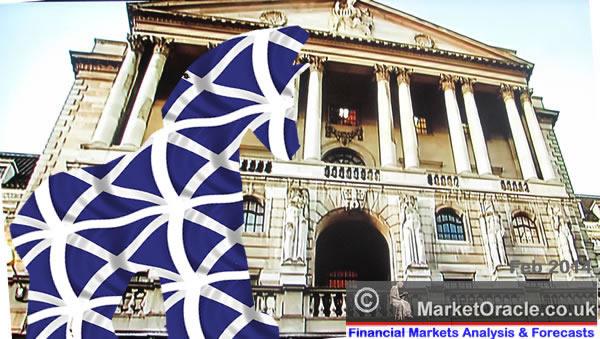 There is PANIC in the air as the NO Campaigns 20% opinion poll lead at the start of 2014 has now completely evaporated as the YES campaign edges into the lead with just 12 days to go.
There is PANIC in the air as the NO Campaigns 20% opinion poll lead at the start of 2014 has now completely evaporated as the YES campaign edges into the lead with just 12 days to go.
“Whether the 300 year old United Kingdom lives or dies will be determined by as few as 4.5% of the British electorate on September 18th as only the people of Scotland, some 9% of the UK electorate have been afforded the luxury of deciding what happens to the United Island of Great Britain, and that if the tunnel visional nationalist have their way they would succeed in setting in motion its termination starting the morning of 19th of September when the world that Brit’s have know for centuries starts to unravel.”
“90% of North Sea oil revenues come from Scottish waters”
….continue reading more from the Market Oracle Scottish Independence YES Vote Panic – Scotland Committing Suicide and Terminating the UK?
Scottish Independence Vote: Investor Implications
By: Axel G. Merk, Merk Investments
Is your portfolio’s fate dependent on Scotland’s? Why is it that when a place known for haggis, kilts and bagpipes indicates it might want to be independent, the markets pay attention?
The usually rather boring pound sterling jumped to life in recent days, becoming one of the world’s most volatile currencies. The trigger was a poll that suggested that the pro-independence camp in Scotland might hold the upper hand in the September 18, 2014 vote. Until recently, that event risk had not been priced in. All else equal, greater volatility warrants a lower price for an instrument (a security or currency). Prudent risk management takes into account the riskiness of the instrument.
Before we discuss specifics for Scotland, I would like to remind everyone that we are literally asking to be surprised by event risks of this sort in general as markets have been rather sleepy- evidenced by low volatility. In our assessment, this lull is a direct result of quantitative easing and related efforts by central bankers around the world that make risky assets appear less risky. Except, of course, the world is a risky place. So when something does pop up, the markets are taken by “surprise.” Just as the sterling fell sharply, the same could happen to the S&P 500 or any other investment. After all, keep in mind that the independence vote is not news; neither is the fact that the yes-vote has been gathering steam. In this complacent market environment risks are being suppressed until they can’t be ignored any longer – then they break out with a vengeance. It’s in this context that investors may want to stress test their portfolios in general- the lack of volatility in your portfolio may be deceiving.
Event risk means that once the event is over, reality ought to settle in. If the vote is NO, i.e. Scotland remains part of the UK, it might cause a relief rally in the sterling. However, if the vote is YES, the outcome isn’t all that obvious. Notably, while everyone is now glued to watching each poll, is Scottish independence, in the short-run might mean more uncertainty as it could trigger, amongst others, a challenge to Prime Minister David Cameron’s government; there’s also a lot of uncertainty around what might happen to the North Sea oil assets. But let’s not forget that Scotland comprises less than 10% of Britain’s GDP. Let’s also not forget that when a country splits up, there may be a flight of mobile capital to the stronger. While Scots rightfully show that that they do quite well based on numerous economic measures, the vulnerability remains with Scotland, as it has to play catch-up with institutions building: what happens if depositors move their deposits from Edinburgh to London? An asset-liability mismatch for the financial sector could be rather precarious as the Scottish financial system is about thirteen times Scotland’s GDP. If there is no access to a lender of last resort, it could destabilize Scotland.
The European Union, in our assessment, will initially play tough, arguing that Scotland will have to apply (and fulfill all criteria) to become an EU member, but ultimately would like an independent Scotland to become a member. Conversely, Scotland may try to take hostage some oil assets. In short, it will be haggling over haggis – a solution to many issues will be negotiated. This would take time.
There’s a silver lining in all of this:
- Greater volatility is good. It’s not good for asset prices, but it’s good for the price discovery process and, as such, the long-term health of one’s portfolio. It’s not healthy that risky assets appear almost risk free, as it encourages capital misallocation, thus inducing bubbles and subsequent crashes.
- Greater volatility is good for currency investors. You may argue you don’t care about those currently speculators, but you should, as 30% to 50% of international equity returns are due to currency moves. If you hedge out currency risk you are missing opportunities. If you ignore currency risk, you are taken for a ride. Active management of currency risk is something prudent investors may want to consider – and the latest flare-up may be the canary in the coal-mine that it’s about time investors take currency risk seriously.
- Opportunities are being created. The same poll that suggested Scots will vote for independence also suggested 44% of Scots believe Scotland would be worse off economically as an independent country (vs 35% thinking Scotland would be better off); similarly, 41% of Scots thought they would be personally worse off with Scotland as an independent country (21% thought they would be better off). To me this suggests a proud Scot may well indicate in a poll that they favor independence, but it doesn’t mean they’ll vote that way. In a world where asset prices are expensive, it’s refreshing to see value opportunities in the markets. And if there’s a ‘YES’ vote, the opportunity may get even better.
On Tuesday, September 16, 2014, please join me for a “fireside chat.” We will make most of the hour available for you to ask questions. Please register to participate. We no longer record our webinars (the regulatory overhead is too much hassle), so join live to get answers to the questions you always wanted to ask.
If you haven’t done so, also make sure you sign up for Merk Insights. If you believe this analysis might be of value to your friends, please share it on your favorite social media site.
Axel Merk
Axel Merk is President and Chief Investment Officer, Merk Investments,
Manager of the Merk Funds.

This is a landmark time.
Just look around you. Look at what’s happening in the world. Clearly, you will see that we are nearing a tipping point for us all.
Thirteen years minus nine days ago, a small group of terrorists attacked the very heart of our nation, setting off a tragic chain of events that have continued to ricochet through time, with a tremendous cost in life and treasure …
 The fall of Saddam Hussein …The U.S. invasion of Iraq …
The fall of Saddam Hussein …The U.S. invasion of Iraq …
The emergence of al-Qaeda in Iraq, and now …
The rise of ISIS, the most brutal, most powerful terrorist organization of all time, bringing us around full circle to the danger of larger terrorist attacks on our soil.
At the same time, in parallel to the global war on terror, we’ve also had a global war on financial crisis.
Fifteen years ago, well before al-Qaeda’s first attacks on America, our tech stocks began to crumble. Over $5 trillion in equity value was wiped out. Our entire economy was temporarily paralyzed. And what’s worse, that crisis set off a tragic chain of economic events that also continue to ricochet through time …
Radical interest-rate cuts …
A great housing bubble — and BUST …
The emergence of a deadly debt crisis …
And now, the most risky and largest Fed money-printing operation of all time.
This chain of events has made the rich — especially wealthy Wall Street institutions — richer. But it has also wiped out vast amounts of invested wealth; the hard-earned savings of millions of everyday Americans.
It has propelled many investors to take unprecedented risks. And it is likely to bring us around full circle to the brink of another, potentially bigger, financial crisis.
So there you have it. The global war on terror. The global war on financial crisis. Two parallel and powerful historical sequences that are gaining momentum and reaching a crescendo.
Just bear in mind that not all is black and white.
For example, in a simplistic view of the world, global conflicts would automatically impact U.S.markets negatively. But that’s not always the case.
In fact, as Larry Edelson has correctly pointed out, right now, troubles overseas are driving large sums of fear money into the U.S. stock market, pushing our stock prices UP — not down.
And as Mike Larson has written, some of that flight capital is also flowing into key U.S. sectors, such as real estate and energy.
This is one reason why our markets have been going up. Another reason is the Federal Reserve. Years ago, bad economic or political news meant bad news for investors — a rationale for avoiding stocks.
But today, the Fed uses bad news as an excuse to pump up the stock market and inflate the economy even more — with tactics that would have been unthinkable years ago. Plus, some stocks have been soaring regardless of the fear money or Fed money, based on their own merits.
One of our readers, John R. has done an excellent job of voicing our readers’ most urgent concerns:
“I am 78 years old and retired after roughly 35 years in the investment management business. There are so many things that worry me, domestically, financially, as well as in the global situation, I don’t know where to start. We have:
“1. Debt levels never seen before with a slim chance or intent to pay them back.
“2. The threat of the US dollar losing its reserve currency status sooner than most people now predict.
“3. A worsening geopolitical situation throughout the world, and no evident world leader stepping up.
“4. For the first time in my life, the threat of radical Islamic terrorism right here in the US.
“5. A nation that’s more divided than any time since the American Civil War.”
John, I couldn’t have said it better myself.
In this environment, the first pitfall to avoid is the thousands of stocks in the world today that seem attractive on the surface, but, in reality, are pure garbage. They’re illiquid, poorly managed, and high risk. And I’d like to send you a complete list of them.
The second pitfall is the traditional buy-and-hold approach to investing. If you want to avoid portfolio-busting losses in a world with tremendous uncertainties, it’s simply not wise.
But the third pitfall is to simply withdraw from investing entirely, even while there are so many new opportunities to build your wealth.
Coming Next
My Ultimate Portfolio
More so than ever before, with the world in constant turmoil and Washington in eternal gridlock, the onus for defining your destiny falls squarely on you.
Wealth building is no longer an option; it’s a must. You will need money in order to insulate yourself from the geopolitical and political threats, to live in the world’s safest places, to be less dependent on the job market, to better secure your retirement, and to preserve your personal freedoms.
That’s what my goal is, both for myself and for our readers. And next up, I plan to give you what I believe is the ultimate wealth-building strategy to achieve all of the above.
This is a critical time for all of us. But by working together, we can get through the tumultuous days ahead in safety and comfort.
Good luck and God bless!
Martin













